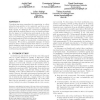Free Online Productivity Tools
i2Speak
i2Symbol
i2OCR
iTex2Img
iWeb2Print
iWeb2Shot
i2Type
iPdf2Split
iPdf2Merge
i2Bopomofo
i2Arabic
i2Style
i2Image
i2PDF
iLatex2Rtf
Sci2ools
MM
2015
ACM
2015
ACM
When the Crowd Challenges the Lab: Lessons Learnt from Subjective Studies on Image Aesthetic Appeal
Crowdsourcing gives researchers the opportunity to collect subjective data quickly, in the real-world, and from a very diverse pool of users. In a long-term study on image aesthetic appeal, we challenged the crowdsourced assessments with typical lab methodologies in order to identify and analyze the impact of crowdsourcing environment on the reliability of subjective data. We identified and conducted three types of crowdsourcing experiments that helped us perform an in-depth analysis of factors influencing reliability and reproducibility of results in uncontrolled crowdsourcing environments. We provide a generalized summary of lessons learnt for future research studies which will try to port labbased evaluation methodologies into crowdsourcing, so that they can avoid the typical pitfalls in design and analysis of crowdsourcing experiments.
MM 2015 | Multimedia |
| Added | 14 Apr 2016 |
| Updated | 14 Apr 2016 |
| Type | Journal |
| Year | 2015 |
| Where | MM |
| Authors | Judith Redi, Ernestasia Siahaan, Pavel Korshunov, Julian Habigt, Tobias Hoßfeld |
Comments (0)

